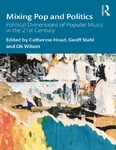Mostrar o rexistro simple do ítem
Yes, Indeed. Trap and politics
| dc.contributor.author | Barros-Grela, Eduardo | |
| dc.date.accessioned | 2024-01-11T10:30:55Z | |
| dc.date.issued | 2022 | |
| dc.identifier.citation | Barros-Grela, Eduardo. “Yes, Indeed. Trap and Politics”, in Mixing Pop and Politics. Political Dimensions of Popular Music in the 21st Century, ed. Catherine Hoad, Geoff Stahl and Oli Wilson. New York: Routledge, 2022, pp. 73-83. https://doi.org/10.4324/9780429284526-7 | es_ES |
| dc.identifier.isbn | 978-0-367-24809-3 | |
| dc.identifier.uri | http://hdl.handle.net/2183/34812 | |
| dc.description.abstract | [Abstract] This chapter discusses Spanish trap music to analyse its political articulations. The lack of critical sources about this specific form of popular culture favours the application of a comparative approach. From a historical point of view, I compare the contemporary trap scene in Spain with the ‘quinqui’ (delinquent) imagery of the 1980s marginal youth, derived from the financial, political, and social crises of the time. Also, from a transnational point of view, I look at Owen Jones’s analysis of chavs, an underclass youth culture in Britain that could be considered as an equivalent to Spanish ‘quinquis’ and ‘trappers.’ This approach endorses a critical observation of Spain’s current politics, extremely polarized after the emergence of post-15-M Movement parties and the radicalization of right-wing political coalitions. | es_ES |
| dc.language.iso | eng | es_ES |
| dc.publisher | Routledge | es_ES |
| dc.relation.uri | https://doir.org/10.4324/9780429284526-7 | es_ES |
| dc.subject | Trap | es_ES |
| dc.subject | Politics | es_ES |
| dc.subject | Working Class | es_ES |
| dc.subject | Music | es_ES |
| dc.title | Yes, Indeed. Trap and politics | es_ES |
| dc.type | info:eu-repo/semantics/bookPart | es_ES |
| dc.rights.access | info:eu-repo/semantics/embargoedAccess | es_ES |
| dc.date.embargoEndDate | 9999-99-99 | es_ES |
| dc.date.embargoLift | 9999-99-99 |






